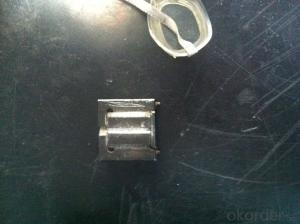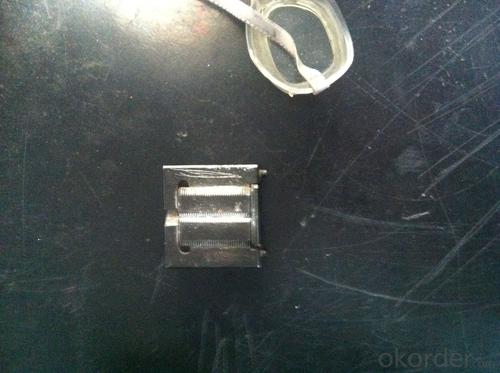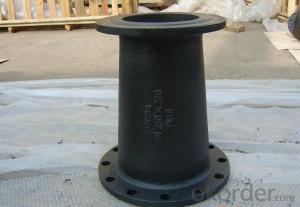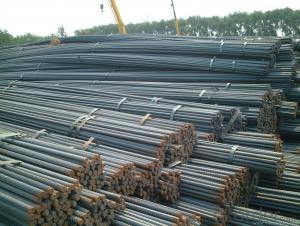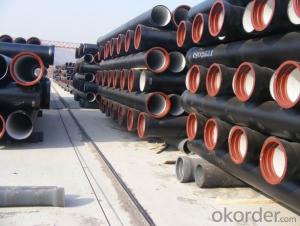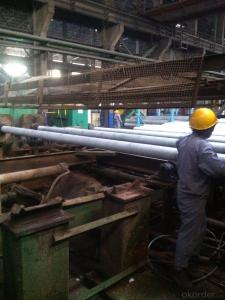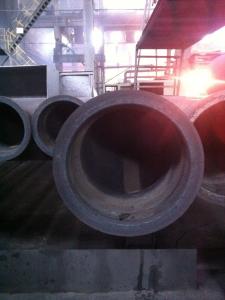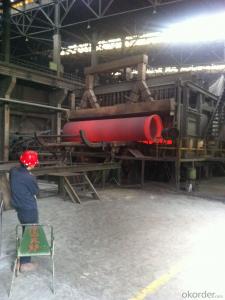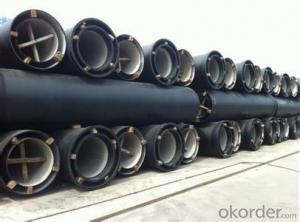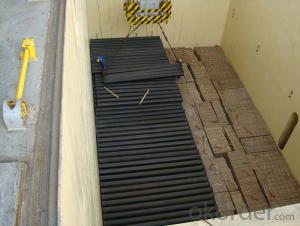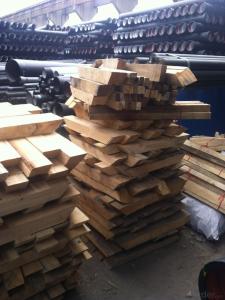DUCTILE IRON PIPEs K9 CLASS DN900
- Loading Port:
- Tianjin
- Payment Terms:
- TT OR LC
- Min Order Qty:
- 32 pc
- Supply Capability:
- 3000 pc/month
OKorder Service Pledge
OKorder Financial Service
You Might Also Like
· Material : Ductile Cast Iron
· Size Range : DN 80mm to DN 2000mm
· Unit Effective Length : 6m or 5.7m
· Manufacture Standard: ISO 2531:1998/ EN 545:2006/EN 598:2007
· Annual capacity : 200,000 tons
· Coating Exterior: Zinc 130g/m2 according to ISO 8179-1 and bitumen coating 70 microns.
· Cement Interior: Portland Cement/ High Alumina Cement/ Sulphate Resisting Cement Lining according to ISO 4179
· Special requirements on external coating and internal lining can be applied
· We also provide accessories such as SBR/EPDM rubber gaskets, lubricant paste, pipe caps, PE sleeves, etc.
Additional Parts:
Each pipe is strictly inspected according to related standard to ensure permanently high performance.
Easy Installation at site and service free for life
Long Service Lifespan
Quotation will arrive you within 24hours once we get your inquiry.
We guarantee offering you a competitive price.
A copy of original inspection reports of pipes will be offered after shipment.
Photos of loading process will be sent to the customer after shipment effect.
We will follow-up the delivery progress after shipment effect and update to the customer on weekly basis.
- Q: What is the average cost of ductile iron pipes?
- The average cost of ductile iron pipes can vary depending on various factors such as diameter, length, and location. On average, ductile iron pipes can range from $30 to $100 per linear foot. For example, a 6-inch diameter ductile iron pipe with a length of 20 feet may cost around $600 to $2,000. It's important to note that these prices are estimates and can change based on market conditions, project specifications, and supplier pricing. Therefore, it is recommended to consult with local suppliers or contractors to obtain accurate pricing information for specific projects.
- Q: Are ductile iron pipes resistant to soil movement?
- Yes, ductile iron pipes are generally resistant to soil movement due to their high tensile strength and flexibility. They can withstand ground settlement, soil shifting, and other forms of soil movement without experiencing significant damage or failure.
- Q: Can ductile iron pipe be used for water treatment plant sludge handling?
- Indeed, water treatment plant sludge handling can utilize ductile iron pipe. Renowned for its robustness and longevity, ductile iron pipe is well-suited for managing diverse fluid types, such as sludge. It possesses the ability to endure the corrosive characteristics of sludge and remains resistant to abrasion, a crucial aspect in any sludge handling system. Moreover, the smooth interior surface of ductile iron pipe aids in preventing obstructions and facilitates the smooth flow of sludge, resulting in enhanced efficiency. In conclusion, ductile iron pipe is an dependable option for water treatment plant sludge handling.
- Q: What is ductile iron pipe?
- The main components of ductile iron pipes are carbon, silicon, manganese, sulfur, phosphorus and magnesium. Execution standard GB/T13295-2003ISO2531/2003
- Q: Can ductile iron pipes be used for wastewater pumping stations?
- Yes, ductile iron pipes can be used for wastewater pumping stations. Ductile iron pipes have excellent strength and durability, making them suitable for transporting wastewater and handling the high pressures and corrosive nature of the sewage. Additionally, ductile iron pipes have a smooth interior surface, which prevents clogs and allows for efficient flow of wastewater. These pipes are also resistant to damage from external factors such as soil movement or heavy traffic, making them a reliable choice for wastewater pumping stations.
- Q: How does ductile iron pipe handle changes in pipe diameter or size?
- Ductile iron pipe is designed to handle changes in pipe diameter or size with relative ease. It possesses excellent flexibility and can accommodate variations in pipe dimensions without compromising its structural integrity. This is mainly due to its unique composition, which includes a significant amount of graphite nodules that provide ductility and elasticity to the material. When faced with changes in pipe diameter or size, ductile iron pipe can be easily manufactured or modified to meet specific requirements. It can be cast or fabricated in various diameters and lengths, allowing for seamless integration and adaptability within a pipeline system. This versatility is particularly beneficial in scenarios where different pipe sizes need to be connected or when the pipeline layout requires alterations. Moreover, ductile iron pipe's superior mechanical properties make it capable of withstanding the stresses and forces associated with changes in pipe diameter or size. It exhibits high tensile strength, impact resistance, and durability, ensuring that it can handle the internal and external pressures exerted on the pipe during operations. Additionally, the jointing systems used with ductile iron pipe contribute to its ability to handle changes in diameter or size. Various joint types, such as push-on, restrained, or mechanical joints, provide secure and leak-free connections between different pipe sections. These joints allow for easy assembly and disassembly, enabling efficient adjustments to the pipe diameter or size as needed. In conclusion, ductile iron pipe is well-equipped to handle changes in pipe diameter or size due to its inherent flexibility, adaptability, and robustness. Its composition, manufacturing capabilities, and jointing systems all contribute to its ability to accommodate variations in pipe dimensions without compromising its performance.
- Q: Does the cast iron have size 250? What's the performance?
- You should be the casting grade or material, if it is ductile iron, said generally between QT400-15 or QT700-2 different indicators, said in front of the tensile strength, the elongation rate refers to the back, China is now the lowest grade of nodular cast iron material is QT400-15, such as QT250.In addition, the number 250 you refer to may also be a code name for ductile iron parts, such as 200, 300, etc., which are manufactured by the factory as required by the project.Gray iron, which has a 250 brand, is generally referred to as HT250, but it is not ductile iron.The machine on the ductile iron and gray iron are used, but generally not made of grey cast iron gear
- Q: Can ductile iron pipes be used for underground sewage systems?
- Underground sewage systems can utilize ductile iron pipes, which offer numerous advantages. Ductile iron is a form of cast iron that possesses improved flexibility and strength, making it suitable for a variety of applications, including sewage systems. The first advantage of ductile iron pipes for underground sewage systems is their exceptional resistance to corrosion. This is particularly important in sewage systems where moisture and chemicals can contribute to corrosion over time. By resisting corrosion, these pipes ensure long-term durability and reliability. Additionally, ductile iron pipes possess high tensile strength, enabling them to withstand the pressure and stress that occur in underground sewage systems. They are also capable of withstanding ground movements, such as soil settling or shifting, which can cause damage to pipes made from other materials. Moreover, ductile iron pipes have a smooth internal surface, resulting in improved flow capacity and reducing the likelihood of clogging or blockages in the sewage system. This smooth surface also minimizes the accumulation of debris and sediment, lessening the need for frequent maintenance and cleaning. Another significant aspect is that ductile iron pipes are available in various sizes and can be easily connected using a range of joint systems. This allows for flexibility when designing and constructing underground sewage systems. In conclusion, ductile iron pipes are an excellent choice for underground sewage systems due to their corrosion resistance, high tensile strength, smooth internal surface, and ease of installation.
- Q: What kind of valves are commonly used in ductile iron pipes?
- You ask the ductile cast iron valves used on no special, because this interface in connection with the valve on the pipe flange is basically, as long as the flange of the valve should be can be used in milling pipe.
- Q: Can ductile iron pipe be used for municipal water supply?
- Yes, ductile iron pipe can be used for municipal water supply. Ductile iron pipe has excellent strength and durability, making it suitable for carrying the high-pressure water supply required for municipal systems. Additionally, its corrosion resistance and long lifespan make it a reliable choice for transporting water in urban areas.
Send your message to us
DUCTILE IRON PIPEs K9 CLASS DN900
- Loading Port:
- Tianjin
- Payment Terms:
- TT OR LC
- Min Order Qty:
- 32 pc
- Supply Capability:
- 3000 pc/month
OKorder Service Pledge
OKorder Financial Service
Similar products
Hot products
Hot Searches
Related keywords
